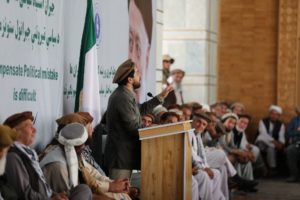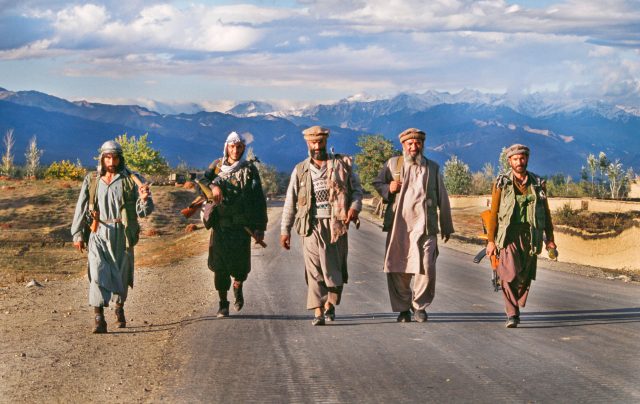We must support the son of Ahmad Shah Massoud, whose mujahideen is pictured (Patrick ROBERT/Sygma via Getty Images)

Trump dreamed of it.
But it’s coming true with Biden.
And historians will never stop wondering what could have induced the 46th president of the United States to commit such a grievous error.
Is it the naïveté of a politician lacking any sense of history or tragedy, the one who took the Taliban at their word when they assured us of their peaceful intentions in Doha in February 2020?
Is it the cynicism of a president already looking ahead to his re-election and pandering to those in swing-states who are said to be fed up with “endless wars”?
Is it an effect of a swing of the pendulum between the four major poles of American diplomacy laid out by Walter Russell Mead: Wilsonianism and its democratic messianism; Jeffersonianism and its hard and fast isolationism; Jacksonianism and its reflex to give tit for tat, but only when US interests appear directly targeted; and Hamiltonianism and the formulation, so dear to France’s Montesquieu, that America’s only truly vital interests were those of peaceful commerce?
Or is this a new pole altogether? One pioneered by Barack Obama in August 2013, when he declined to enforce the red line that he had said would be irretrievably crossed if the Syrian leader resorted to the use of chemical weapons against his own citizens? The one at work when, without warning or any shred of moral or strategic interest, Donald Trump abandoned his country’s Kurdish allies, first in Iraq when he allowed the pro-Iranian militias to invade Kirkuk, then in Syria when he allowed Erdogan’s murderous proxies to enter Rojava? The one brought to its culmination in the present Afghan rout, this abject display of open desertion being broadcast live to the world and punctuated, as I write, by scenes of panic and chaos at Kabul airport that could easily be mistaken for those in Saigon in 1975?
Is it, in other words, the consolidation of a trend that I first sensed almost twenty years ago, when writing American Vertigo and later developed in The Empire and the Five Kings? Gone the great power, which has jettisoned its dreams of exceptionalism, its ambition to be a shining city upon a hill! Broken, the gracious Virgilian thread that made the invention of America a new Aeneid whose mission was no longer to rebuild Troy in Rome or Rome on a grand scale in Europe, but to reinvent Europe with improvements! Onward toward a new pre-Columbian order in which the old empire, in retreat, no longer counts and makes way for the latter-day reincarnations of the Ottoman Empire, Greater Persia, Great Russia, Imperial China, and, as here, the new Ummah made possible by a radical misreading of the Koran!
It is too early to know for certain.
And each of these explanations is at least partially true.
But the time has come for a review of accounts.
And that review shows that what the most pessimistic of us feared must be booked not just as a loss but as an abomination in three parts:
- The wolves are through the gate
They are hunting down the supporters of republican government and institutions, as well as my journalist friends from Tolo News.
They are sending women back to their fabric prisons after many thousands of them had tasted dignity and become accustomed to gender equality and the freedom to show their faces.
Sharia is the law of the land.
Lists of suspects, banned and “wanted” people are being posted at the entrances to neighbourhoods, sounding an ominous clarion call.
Islamic tribunals will soon be operating at full speed, with their absurd crimes and atrocious punishments.
And the scenes of stoning that have been filmed over the past few months in remote villages will be reenacted live in Herat, Kandahar, Mazar-i-Sharif and Kabul, sites of high civilisation where the descendants of horsemen and poets had begun to embrace the democratic dream.
A people are in agony.
The triumph of a strain of barbarism that, twenty years ago, the great democracies and their Afghan allies easily defeated and whose legions of rabble on motorbikes are no more formidable today than they were back then.
And of naïveté, when the American administration, speaking through national security adviser Jake Sullivan, adds credulity to dishonour by accepting the Taliban’s word that it is ready to “protect” civilians seeking to be evacuated from the country while offering dubious evidence of good intentions.
Worse than a crime, this is a mistake.
And, worse than a mistake, it is a stain.
A stain on the term of Joe Biden, whose first dramatic error this is.
But also, in a greater sense, this stain dishonours the modern conscience. It will take a long time for that conscience to forget this failure, this shame.
- And what of the United States?
Already devalued by the sacrifice of the Kurds on the altar of appeasement, first toward Iran (the Kurdish Peshmerga in Iraq) and then toward Turkey (the Kurds in Syria), the word of the United States is suddenly worth nothing.
Imagine you are a Ukrainian in Donbass battling, in the trenches of Luhansk or Donetsk, pro-Russian separatists and mercenaries in the pay of the Kremlin.
An Armenian in Nagorno-Karabakh who has learned that the resentment of those pining for a return of the Ottoman Empire and denying the genocide of their ancestors knows no bounds or limitations.
Or a Taiwanese, South Korean or even a Japanese sensing the nearby presence of the iron jaw of Chinese totalitarianism just waiting to bite.
To say nothing of the Balts, the Poles, the Czechs — of Europeans, in other words — who had been living, like the generation of the founders of Europe, in the belief that venerable old treaties protected them and ensured their security.
What do they all think of this self-inflicted Saigon? This geopolitical suicide? How can they avoid ruminating on the betrayal and massacre of Carthage’s Punic allies, as recounted by Gustave Flaubert in his novel Salammbô, when confronted with this spectacle, this disarray in a diplomatic system that has made the inexplicable choice, just weeks before the anniversary of September 11, of returning Afghanistan to the terrorists on a silver platter and allowing them to build a nest for the vipers of the new Al-Qaeda and their ilk? When confronted, yes, with the direct, deliberate and slow-motion abandonment of a people who, like the Kurds, were our rampart against radical Islam and protected the world from terrorism? Under the circumstances, how is it possible not to conclude that if Putin, Erdogan or Xi got it in his head to fill part of the void created by the American retreat there would be no one to oppose him?
Dizzying.
An Afghan Anschluss.
Munich on all fronts.
And even if one must be wary of comparing the incomparable, this is truly terrible.
- But then, there is Panjshir
There remains, living in his homeland of Panjshir, one young man, Ahmad Massoud, son of the legendary Commander Ahmad Shah Massoud, who, in his day, embodied the struggle against the Taliban and Al-Qaeda and who was assassinated two days before September 11.
A few days ago, just a few hours after the fall of Kabul, the young Ahmad Massoud was able to elude the hired killers sent to track him down.
Knowing that if they captured him, he might suffer the same fate as his illustrious father, he did exactly what his father had done, a little less than twenty-five years ago, after the first fall of Kabul, when he managed to get hold of one of the last old helicopters that the Taliban had not yet taken over and took refuge in his bastion in Panjshir, above the Shomali Plain, to organise the Afghan resistance.
He wrote to me from his native village on Monday (16 August), several hours after rejoining his commanders.
“We find ourselves,” he wrote, “in the situation of Europe in 1940.”
The debacle is complete, he continued.
The spirit of collaboration is all around us.
Subjugation is closing in with sound and fury.
As Kabul groans, as the villages of the north and south are put in chains, vengeance is unfurling over our wounded land.
But despite reversal and even catastrophe, all is not lost, he told me.

With my Mujahideen, I intend to resume the struggle.
I call on all free women and men in the world, friends of Afghanistan old and young, to join us in spirit.
I call on all free fighters from all over the country, whatever their origin or ethnicity, to come to our valleys.
Already, he continued, groups of brave citizens are moving to the front with their creed, their bravery, and their antique rifles and grenade launchers.
I welcome them!
They will be — we will be — the living faces of the Resistance, and, soon enough, of the counteroffensive.
Free Afghanistan has lost Kabul, but it has not lost the war.
Massoud’s words were the words of the Spanish republicans in 1936.
Of Czech president Beneš in 1939 and of Alija Izetbegović, in 1992, at the height of the siege of Sarajevo, when he gave me a dramatic message to pass on to French president François Mitterrand.
Almost word for word, they are the words of General de Gaulle’s radio address to his defeated countrymen in June 1940, broadcast from London, in which he urged them not to submit but to continue to fight.
Except that the Afghans were betrayed, the young Massoud pointed out. Betrayed but not defeated. And they were not defeated because their leadership, their generals, did not even take them into battle.
* * *
I know this young man, just as I knew his father.
I have done numerous video interviews in the mountains of Panjshir, where, for a year, Massoud has been quietly preparing for the worst and stockpiling arms, equipment and supplies, as his father had done.
I trust him.
I believe him when he says he inherited from his father the taste for freedom and the instinct of fighting to defend it.
I believe him when he insists that he has no choice and that the fight is now ineluctably his, body and soul.
I believe that when he issues a call for all free Afghans who love their country and reject servitude, whether living in Afghanistan or abroad, to join him, he is not only sincere but credible.
At my initiative, France’s President Macron received him at the Elysée Palace on April 5, 2021.
I was present at that meeting, where the best of France appeared to have a rendezvous with an heir to the noblest anti-totalitarian and anti-fascist struggles of the twentieth and twenty-first centuries.
And I am convinced that, in the new Great Game that lies ahead, it is this young man whom France, Britain and the rest of Europe will have to support.
In this area of the world, he is the embodiment of the future and of hope.










Join the discussion
Join like minded readers that support our journalism by becoming a paid subscriber
To join the discussion in the comments, become a paid subscriber.
Join like minded readers that support our journalism, read unlimited articles and enjoy other subscriber-only benefits.
Subscribe